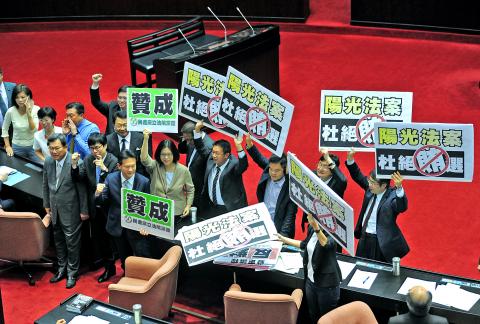Amendments to the Local Government Act (地方制度法) requiring speakers and deputy speakers of local councils to be elected by open ballots cleared the legislative floor yesterday.
Existing local government law stipulates that speakers and deputy speakers of the councils of special municipalities, cities and counties, and the chairpersons and vice chairpersons of township councils, “shall be elected or recalled by secret ballot by the councilors of the special municipality, county/city councilors, and township/city representatives.”
The amendments changed the wording of the act from “secret” to “registered” votes.

Photo: Wang Yi-sung, Taipei Times
Before the amendments were voted on — following Chinese Nationalist Party (KMT) objections to the the proposed amendments — Democratic Progressive Party lawmakers took turns to applaud the change and said the proposal would make local politics more transparent and hold politicians accountable to voters.
Open ballots in local councils are not unconstitutional — as the KMT has alleged — since what the Constitution guarantees is the secrecy of votes, Tainan DPP Legislator Wang Ting-yu (王定宇) said.
“The councilors are accountable to the electorate through their votes in the councils and they should be properly monitored. Some say that with registered votes, it would be even easier for those who bribe councilors to see if their money has been well spent, but with party politics now dominating local councils, unless an entire party caucus is bribed it is simply impossible for open votes to encourage corruption,” he said, adding that the past “flashing of votes,” which was done to show the representatives’ adherence to party discipline, was ruled not to be a crime by every level of court.
Tainan DPP legislators Lin Chun-hsien (林俊憲), Chen Ting-fei (陳亭妃) and Huang Wei-che (黃偉哲) all commented on the proposal after the vote — which easily passed with the DPP’s majority — and lauded it as a great improvement for Taiwan’s democracy and the beginning of the end for rampant bribery in local politics.
DPP Legislator Kuan Bi-ling (管碧玲) said the amendments would become a milestone in Taiwan’s democratic development.
“There is a consensus among those who study Taiwan’s politics that local politics has long been plagued by so-called ‘black money.’ During [one-party state rule under the KMT] Chiang Kai-shek (蔣介石) encouraged local factionism by granting special permission for certain people to run some types of business — such as natural gas, coaches and credit unions. Today our votes ended the KMT’s black money politics and changed the definition of Taiwan’s local politics,” she said.
The amendment is widely seen as being sparked by alleged corruption involving Tainan City Council Speaker Lee Chuan-chiao (李全教) of the KMT, who in April was sentenced to a four-year prison term by the Tainan District Court for vote-buying in the city council’s speakership election on Dec. 25, 2014, and was suspended from his position as speaker.

ANOTHER EMERGES: The CWA yesterday said this year’s fourth storm of the typhoon season had formed in the South China Sea, but was not expected to affect Taiwan Tropical Storm Gaemi has intensified slightly as it heads toward Taiwan, where it is expected to affect the country in the coming days, the Central Weather Administration (CWA) said yesterday. As of 8am yesterday, the 120km-radius storm was 800km southeast of Oluanpi (鵝鑾鼻), Taiwan’s southernmost tip, moving at 9kph northwest, the agency said. A sea warning for Gaemi could be issued tonight at the earliest, it said, adding that the storm is projected to be closest to Taiwan on Wednesday or Thursday. Gaemi’s potential effect on Taiwan remains unclear, as that would depend on its direction, radius and intensity, forecasters said. Former Weather Forecast

As COVID-19 cases in Japan have been increasing for 10 consecutive weeks, people should get vaccinated before visiting the nation, the Centers for Disease Control (CDC) said. The centers reported 773 hospitalizations and 124 deaths related to COVID-19 in Taiwan last week. CDC Epidemic Intelligence Center Director Guo Hung-wei (郭宏偉) on Tuesday said the number of weekly COVID-19 cases reported in Japan has been increasing since mid-May and surpassed 55,000 cases from July 8 to July 14. The average number of COVID-19 patients at Japan’s healthcare facilities that week was also 1.39 times that of the week before and KP.3 is the dominant

The Chinese Communist Party’s (CCP) working group for Taiwan-related policies is likely to be upgraded to a committee-level body, a report commissioned by the Mainland Affairs Council (MAC) said. As Chinese President Xi Jinping (習近平) is increasingly likely to upgrade the CCP’s Central Leading Group for Taiwan Affairs, Taiwanese authorities should prepare by researching Xi and the CCP, the report said. At the third plenary session of the 20th Central Committee of the CCP, which ended on Thursday last week, the party set a target of 2029 for the completion of some tasks, meaning that Xi is likely preparing to

US-CHINA TRADE DISPUTE: Despite Beijing’s offer of preferential treatment, the lure of China has dimmed as Taiwanese and international investors move out Japan and the US have become the favored destinations for Taiwanese graduates as China’s attraction has waned over the years, the Ministry of Labor said. According to the ministry’s latest income and employment advisory published this month, 3,215 Taiwanese university graduates from the class of 2020 went to Japan, surpassing for the first time the 2,881 graduates who went to China. A total of 2,300 graduates from the class of 2021 went to the US, compared with the 2,262 who went to China, the document showed. The trend continued for the class of 2023, of whom 1,460 went to Japan, 1,334 went to